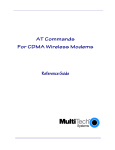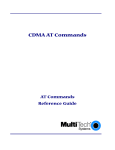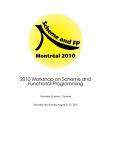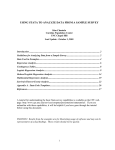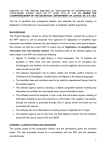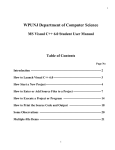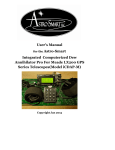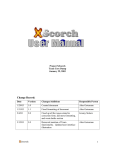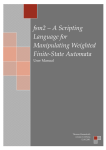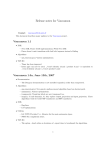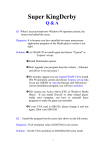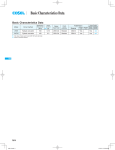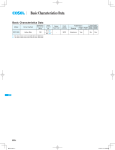Download WPDS++ User Manual - Computer Sciences Dept.
Transcript
WPDS++ User Manual ∗
October 5, 2005
1
Introduction
WPDS++ is an open-source library for implementing Weighted Pushdown Systems (WPDSs). The library is
designed as a set of templated C++ [3] classes. The template parameter is a user-defined implementation of
a bounded idempotent semiring. Though WPDS++ is a general implementation of Weighted Pushdown Systems, it was designed with the primary purpose of performing interprocedural dataflow analysis of computer
programs. It is assumed that the reader is familiar with both Weighted Pushdown Systems and interprocedural dataflow analysis. This user manual does not describe the theoretical underpinnings of Weighted
Pushdown Systems or interprocedural dataflow analysis. For more details on the subject, see [1, 2].
2
Implementing a Weight Domain
As described earlier, WPDS++ is a collection of templated C++ class files. The template parameter is a
user-defined implementation of a semiring (whose elements are typically a family of dataflow transformers).
The semiring must implement a certain collection of methods for a WPDS++ application to compile. The
following subsections describe each of these methods. The T listed in the method signatures refers to the
classname that defines the semiring. A semiring element is an instance of the semiring implementation class,
and is referred to by T*.
2.1 One - 1̄
T* T::one() const;
one returns a pointer to the 1̄ semiring element.
2.2 Zero - 0̄
T* T::zero() const;
zero returns a pointer to the 0̄ element of the Semiring.
2.3 Combine - ⊕
T* T::combine( const T* t ) const;
combine takes a semiring element parameter and returns a new semiring element that is the combination
of this and the parameter t (*this ⊕ *t). Combine should not overwrite this or input parameter t.
∗
This material is based upon work supported by the National Science Foundation under Grant No. 9986308. Any opinions,
findings, and conclusions or recommendations expressed in this material are those of the author(s) and do not necessarily reflect
the views of the National Science Foundation.
1
2.4 Extend - ⊗
T* T::extend( const T* t ) const;
extend takes a semiring element parameter and returns a new semiring element that is equal to this
extended by the parameter t (this ⊗ t). extend is typically related to functional composition; i.e.,
this ⊗ t is functionally equivalent to t ◦ this. Extend should not overwrite this or input parameter t.
2.5 Equal
bool T::equal( T* t ) const;
equal returns true if two semiring elements are equal and false otherwise. There is currently no method
specifically designed to deal with partial orders. However, for any two semiring elements α and β, α v β
⇔α = (α ⊕ β).
2.6 Print
std::ostream& T::print( std::ostream& o ) const;
print writes a semiring element to the std::ostream parameter, i.e. o. It should return the same
std::ostream when finished.
2.7 Reference Counting
ref_ptr<T>::count_t count;
WPDS++ provides reference counting for user-created semiring elements (instances of T*). To do this, the
semiring element must have a publicly accessible field named count. The class ref_ptr<T> defines the
type count_t for the type of the count field (it is currently an unsigned int but may change in the
future). For reference counting to work properly, count should be initialized to 0. To turn off reference
counting, initialize count to a positive number, e.g. 60.
2.8 The Reach Weight Domain
The following weight domain implements simple reachability. The weight is 1̄ if it is reachable by the WPDS
and 0̄ otherwise. Using this weight domain is equivalent to using a Pushdown System without weights. All
user created weights are 1̄ and (abstractly) unreachable configurations have weight 0̄.
#include "ref_ptr.h"
class Reach
{
bool isreached;
public:
ref_ptr< Reach >::count_t count;
Reach( bool b ) : isreached(b),count(0) {}
Reach* one() const { return new Reach(true); }
Reach* zero() const { return new Reach(false); }
2
// zero is the annihilator for extend
Reach* extend( Reach* rhs ) const {
if( isreached && rhs->isreached )
return one();
else // this or rhs is zero()
return zero();
}
// zero is neutral for combine
Reach* combine( Reach* rhs ) const {
if( isreached || rhs->isreached )
return one();
else
return zero();
}
bool equal( Reach* rhs ) const {
return ( isreached == rhs->isreached );
}
std::ostream& print( std::ostream& o ) const {
if( isreached )
o << "ONE";
else
o << "ZERO";
return o;
}
};
3
Creating the Weighted Pushdown System
The transformation from program to WPDS is straightforward. There are three types of rules in the WPDS
corresponding to three types of edges in the program’s callgraph. The type of a rule is distinguished by
the number of stack symbols on the right-hand side of the rule. More precisely, rules with one, two, or
zero right-hand side stack symbol(s) correspond to intraprocedural, interprocedural call, and interprocedural
return edges, respectively. To be clear, Figure 2 is a translation of the pseudo code in Figure 1 into a WPDS
using the Reach semiring.
The C++ program in Figure 2 creates a WPDS and prints it to std::out. Some new classes and
types are used in the example program. One class is named wpds::Semiring. The wpds::Semiring
class is used by the wpds::WPDS class to call the user-defined semiring methods (in this case, the methods of class Reach). It is instantiated with a semiring element (it is customary to use 1̄ for instantiation). A second type used in Figure 2 is the wpds::wpds_key_t object. The WPDS++ library only
knows about keys. A key is a way of identifying a state or stack symbol of the WPDS. Each key has a
unique wpds::key_source object associated with it. Some common sources have been defined like
wpds::string_src and wpds::int_src. User’s can define their own key source by subclassing the
wpds::key_source class (see key_source.h). The function str2key is simply a helpful wrapper
for creating a wpds::string_src and returns the wpds::wpds_key_t associated with that object.
A similar function int2key exists for working with wpds::int_src. Once all the keys have been
3
x = 0
y = 0
fun f()
n0:
n1:
n2:
n3:
n4:
n5:
<$ f enter node $>
if( x = 0 )
then y := 1
else y := 2
g()
<$ f exit node $>
fun g()
n6:
n7:
n8:
n9:
<$ g
y :=
x :=
<$ g
enter node $>
4
60
exit node $>
Figure 1: Pseudo code.
defined, the rules are added to the myWpds object.
4
Queries in WPDS++
4.1 Prestar and Poststar
WPDS++ allows for two types of queries, prestar and poststar. A query takes as input a WPDS, a Configuration Automaton, and a Semiring. A query outputs a new annotated Configuration Automaton. Configuration
Automata are represented by the class wpds::CA. The constructor takes a wpds::Semiring as its one
input. Transitions are added to the CA class using the wpds::CA::add method. The following sample
code creates a Configuration Automaton query, and performs a poststar reachability query with respect to
WPDS myWpds (created in Figure 2). A prestar query is performed similarly.
wpds::CA< Reach > query( s );
query.add( p, n[0], accept, reachOne );
query.print( std::cout << "BEFORE\n" ) << std::endl;
wpds::CA< Reach > answer = wpds::poststar< Reach >(myWpds,query,s);
answer.print( std::cout << "\nAFTER\n" ) << std::endl;
4.2 Path Summary
A path-summary query is performed on a wpds::CA. It annotates the states of the automaton with a semiring element that represents the sum (⊕) over all paths from that state to the accepting state of the automaton.
If there is no accepting state, then every state will be annotated with 0̄. The following code illustrates a
path-summary query (again assuming we have the same objects created in Figure 2 and subsection 4.1).
After the path-summary method completes, the code retrieves the weight annotation for state p and writes it
to std::cout.
answer.path_summary();
ref_ptr< Reach > pWeight = answer.state_weight( p );
std::cout << "Weight on state \"p\": ";
4
#include
#include
#include
#include
"WPDS.h"
"Reach.h"
<string>
<sstream>
int main()
{
Reach* reachOne = new Reach(true);
wpds::Semiring< Reach > s( reachOne );
wpds::WPDS< Reach > myWpds(s);
wpds::wpds_key_t p = str2key("p");
wpds::wpds_key_t accept = str2key("accept");
wpds::wpds_key_t n[10];
for( int i=0 ; i < 10 ; i++ ) {
std::stringstream ss;
ss << "n" << i;
n[i] = str2key( ss.str() );
}
// f intraprocedural
myWpds.add_rule( p, n[0],
myWpds.add_rule( p, n[1],
myWpds.add_rule( p, n[1],
myWpds.add_rule( p, n[2],
myWpds.add_rule( p, n[3],
p,
p,
p,
p,
p,
n[1],
n[2],
n[3],
n[4],
n[4],
reachOne);
reachOne);
reachOne);
reachOne);
reachOne);
// g intraprocedural
myWpds.add_rule( p, n[6], p, n[7], reachOne);
myWpds.add_rule( p, n[7], p, n[8], reachOne);
myWpds.add_rule( p, n[8], p, n[9], reachOne);
// f call g
myWpds.add_rule( p, n[4], p, n[6], n[5], reachOne);
// f return
myWpds.add_rule( p, n[5] , p , reachOne);
// g return
myWpds.add_rule( p, n[9] , p , reachOne);
// Print the WPDS
myWpds.print( std::cout ) << std::endl;
return 0;
}
Figure 2: WPDS++ encoding of the pseudo code in Figure 1.
5
pWeight->print( std::cout ) << std::endl;
WPDS++ returns weights as values of type ref_ptr<T> (i.e., an instance of the ref_ptr class instantiated with the user’s semiring). In most cases, a ref_ptr acts like an ordinary C++ pointer. Two additional methods that might be of interest are ref_ptr<T>::is_valid and ref_ptr<T>::get_ptr.
ref_ptr<T>::is_valid is a null pointer check, and ref_ptr<T>::get_ptr returns the underlying object pointer. There is no guarantee that a pointer retrieved from a ref_ptr will remain valid if the
ref_ptr object goes out of scope. For more information see ref_ptr.h.
4.3 Reglang Query
Reglang queries are queries over an automaton with respect to a regular language.1 For example, after a
poststar (prestar) query, the user can ask for the weight that is the sum over all paths that end (begin) in
a configuration in the regular language defined by some automaton (i.e., an object of class wpds::CA).
In terms of interprocedural dataflow analysis, this allows the user to perform stack-qualified queries on a
supplied program. In the current implementation, the regular language is supplied as an object of class
wpds::CA. The weights on the wpds::CA encoding the regular language are silently ignored. The following code performs a reglang_query on our running example (Figure 2 and subsection 4.1). It asks
for the weight of function g’s exit node with calling context f. Calling contexts are expressed by the return
points of function call sites. The set of function return points is the set consisting of the rightmost stack
symbols of WPDS rules with two right-hand side stack symbols.
wpds::CA< Reach > reglang( s );
Reach *ignored = new Reach( true );
// manually add transitions of the regular expression
reglang.add( str2key("t1") , n[9] , str2key("t2") , ignored);
reglang.add( str2key("t2") , n[5] , str2key("t3") , ignored);
reglang.add_initial_state( str2key("t1") );
reglang.add_final_state( str2key("t3") );
// answer is the same CA from the earlier poststar example
ref_ptr< Reach > reglangWeight = answer.reglang_query( reglang )
std::cout << "Result of reglang_query: ";
reglangWeight->print( std::cout ) << std::endl;
References
[1] Thomas Reps, Stefan Schwoon, Somesh Jha, and Dave Melski. Weighted pushdown systems and their
application to interprocedural dataflow analysis. Science of Computer Programming, 2005. to appear.
1
[2] Stefan Schwoon. Model-Checking Pushdown Systems. PhD thesis, Technische Universität München,
2002. 1
[3] Bjarne Stroustrup. The C++ Programming Language. Addison-Wesley Longman Publishing Co., Inc.,
2000. 1
1
wpds::CA<T>::reglang query is not currently supported with Visual Studio 6.0
6






